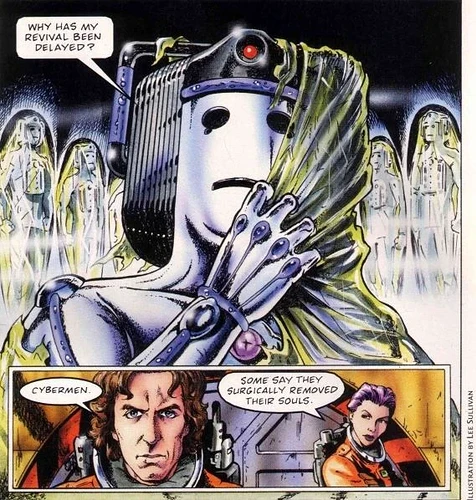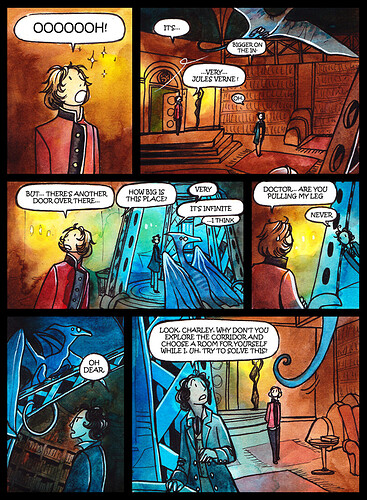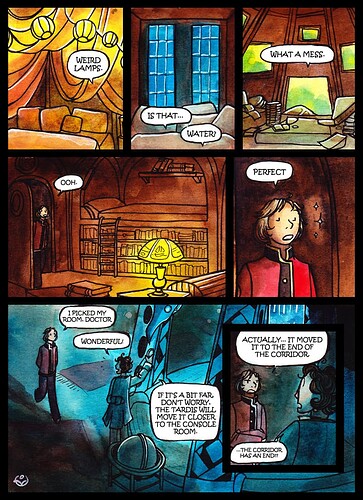AUDIO CLUB HOW I HAVE MISSED THEE, I wonder what exciting offering I will be able to listen to now that I have returned, what wonde-
Oh. Sword of Orion, you say? Written by Nicholas Briggs, you say?
OK fine I’ll listen.
PRE-LISTEN REMINISCENCES
I remember being bored to tears by this one pretty much every time I have tried to listen to it. For me, it represents the Franchise Original Sin of Nicholas Briggs - from the generic space crew involved in some less-than-legal operations, the stoic and no-nonsense female military hero, lots of airlock drama, and of course, the Cybermen, I remember there being a lot in here that now makes me think that Nick Briggs is painting by numbers, because we’ve had so many of this type of story in the years from then to now.
However, as people in this thread have mentioned the strength of McGann and Fisher’s performances, I’m gonna give it another go today and have a think about that, and also try to remember that technically this is the first Nick Briggs Cybermen story (and the first BF Cybermen story period) and try to be kinder.
EPISODE ONE - “Scanning for money, scanning for money, scanning for money…”
Popped the first episode on while I took the dog for a short walk - sadly, she’s old and it’s a warm day so we didn’t make it past the first ten minutes, but I finished the rest while sort of just pottering around the house, trying to do a focused listen. First of all, 34 minutes! That’s long for an Ep 1 by today’s standards. Second of all, despite my attempt to do a focused listen, Nick just has a way with dialog that makes me zone out so easily. A couple of times I had to skip back a minute or so because my brain just glossed over and suddenly The Doctor and Charley were on a different ship. There’s also a moment where The Doctor goes “Oh no…” like he’s seen something dreadful, but then when we cut back to them they’re just heading back to the TARDIS with no real explanation? It’s a little muddled.
Still, I found a fair bit to enjoy here - India Fisher and Paul McGann have great chemistry, and I’m really enjoying Paul’s wry, almost aloof mystery that he’s playing 8 with. The way he silently returns to Charley after watching her in the Garazone marketplace (also bonus points for Charley punching an alien, although points rescinded for being another BF Main Range where “the female companion is menaced in a weird sexual way” is a trope) and the sort of underplayed, sonorous way he delivers some lines capture a very high Gothic Doctor, one who is guarded but still openly emotional. There’s a lot to like in this performance. Garazone is an interesting and evocative location, and the paving slab anti-grav chase is a fun action sequence (so fun in fact that it will be reused multiple times in different iterations, getting less fun each time).
Then we come to the salvage crew. A gang of Cockney accents so interchangeable that I couldn’t tell you a single character name, except Gemini because she’s the only female crew member. Does Nick Briggs have mummy issues? Seems like every other story he puts in a powerful if standoffish matriarch who all the men in the story will inevitably spend half the run-time insulting or condescending to. It’s all very strange, and they’re the part of the episode that falls flat. All the airlock talk, the technobabble nonsense (except the temporal energy/warp drive shunting the TARDIS, that was neat and made sense), it just doesn’t move me, and there’s nothing in here to make any of the characters stand out. This also extends to the two generic salvage lads that get murdered at the start. It makes the ending fall a bit flat - I don’t really care about the fellow being menaced by a Cyberman.
However, and maybe it’s because I watched the trailer for Alien: Romulus (v hyped) this morning and it’s in my head, but there’s definitely something of the Ridley Scott in this very chunky, hard-tech, abandoned star destroyer vibe. Noises banging across the hull, jumpy crewmen, it’s actually a well realized atmosphere of tension. Also, the foreshadowing of the smell of the ship - when you know what the source of that smell is, it just compounds the dread every time they bring it up, which is highly effective.
All in all, this is enough to make me keep listening even if I weren’t going to listen regardless for Audio Club, if only in the vain hope that half the Cockney accents are Cyber-necksnapped by Episode 3.
EPISODE 2 - MUTINY ON THE…Oh, I’ve forgotten the ship’s name again.
So episode 1 ends with the Cyberman cliffhanger (sort of, it’s never really confirmed) and we begin episode 2 with your classic Doctor Who trope - Charley and The Doctor end up standing too close to a body and are rapidly accused of the murder so that they can be taken to wherever the plot is happening next.
The thing that interests and sticks in my brain about this episode is an extremely subtle piece of nightmare fuel relating to the death of Riley (Kelsey? God, I can’t remember.) Cybermen carry no bladed weapons, they don’t even really carry guns that pierce with conventional projectiles. Yet when they find the crewman, Charley mentions the amount of blood that there is on the body. Now yes, they mention that he was “pulverized”, but being pulverized still doesn’t necessarily cause you to bleed so profusely that people would not know where to begin to stop it. You know what probably would cause that amount of bleeding?
Multiple compound fractures. The Cyberman quite probably broke every single major bone in the man’s body with such force that those bones were forcibly ejected from his skin - a compound fracture of the femur could absolutely rupture the femoral artery and cause a bleedout of that level. Multiply that to every bone, and, well. Shivers. I like when the Cybermen are scary, but not for the obvious reasons.
Obviously the Cybermats are there too; what shocks me a little is that The Doctor doesn’t immediately speculate and assume it’s Cybermats from the evidence, considering they’re following the classic Cybermat script. That’s followed up by the almost unceremonious appearance of the Cyberman proper, and The Doctor’s half baked exclamation; “A rogue Cyberman!” Rogue from what, Doctor?
Apart from that the rest of the episode is terribly predictable and really not that interesting. The mutiny isn’t particularly telegraphed and sort of just feels like padding, and the captain seems to just take it in stride (although if this is foreshadowing to her true nature, then I can buy it a little more.) The offhand remarks about the Orion War and the androids are some nice world-building and setup for the final two episodes, but it just gets bogged down in the subplots, of which there are too many. A mutiny, smugglers, an android war in Orion, the Cybermen. It all feels very unfocused.
I also extend my apologies to the Cockneys, as I realize at least one of the spacemen has a Northern accent, not a Cockney one. Still, “Generic space-crew of regional accents” is hardly breaking new moulds for Doctor Who.
EPISODE 3 - Do Cybermen really run faster than humans?
I’m really not doing much of anything today apart from listening to this and it still struggles to stick in my memory. Obviously this header is the big question - at some point in the story, The Doctor says “oh no, Cybermen run faster than people!” and first of all, this is not at all signified in the story (we get multiple extended dialog-free sections that I suppose are sort meant to represent the Cybermen being revived, because of course we all know that the best things to put on audio are processes that are striking almost entirely because of their visual component, but you couldn’t foley in a few heavy clunking footsteps to show them running?) and second of all, have we ever seen Cybermen running? At all?
In general the Cybermen in this are weirdly characterized. Their voices, despite Nick Briggs’ very competent vocal and acting performances, don’t remind me of any other Cybermen, and the fact that they use mind control on Grash is definitely something more in the Dalek wheelhouse. I can’t remember a story where a Cyberman shooting someone led to them being mind-controlled by them. Still, it’s better than my original thought about Grash dying and then coming back, which is that Grash dying was from a first draft, Nick realized he still needed him for plot, and just sort of smushed him back in. I was glad towards the end of the episode where the mind-control that I expected might have been at play paid off, but then just confused because it doesn’t seem like a particularly Cybermen plot.
Then we get the android stuff - I mean it’s pretty clear now that Riva (Reva?) is an android, but that’s about as much as we find out about them in this episode, apart that there aren’t any outside the Orion system. That doesn’t make me feel good, as we have one episode left in this already overstuffed story, meaning we’re going to have to cram androids, Orion, Reva, AND what’s going on with the Cybermen all into one final episode, as well as resolving the actual plot. And what’s going to happen to Ramsey?
There is a sense that things are ramping up (although the airlock scenes again [I swear you could do a drinking game with these] just make the whole thing drag a little.) I’m not leaning towards this being a bad episode, it’s perfectly serviceable so far, and miles away from some of BF’s 2000s stinkers, but it feels overstuffed and a bit directionless.
EPISODE 4 - THIS MORAL CONVERSATION IS IRRELEVANT
Great line from the Cyberleader for the header quote. I also want to give a really big shout-out to the Big Finish McGann era theme music - it’s incredibly evocative, not like any intro theme we’ve had before. It doubles down on the Jules Verne of it all and gives the entire series a very sort of high Gothic spooky vibe. Just wonderful work.
Now though, we come to the episode. I will admit that it wasn’t as overstuffed as I thought it was gonna be. They explain the Orion Android war pretty succinctly (and was I the only one wondering whether this came out before or after the Animatrix movie, because the backstory of the entire Matrix universe is very close to what happens with the androids here) and then we’re back to the action. There’s more airlock and mind-control nonsense, but those are parts of the story I’ve basically given up caring about by this point. There are a couple of big points from this episode I need to talk about though, one good, and one bad.
Actually, before we get to them, I wonder how many people actually bought the bait-and-switch of Riva being an android, but then also working for the Androids instead of the Human Security Service? I just think that if we could have figured out Riva was an android by episode 2, why couldn’t The Doctor? He’s just a bit of a non-feature in this episode. He doesn’t solve any of the problems, either, the ion storm basically does it all for him.
Anyway back to the bad and the good, and I’ll go with the bad first because it introduces a MAJOR plot hole to basically the entire Cyberman concept. Grash is in the process of being Cyber-converted, along with the rest of them, and then he starts going on a pretty poorly written rant because his mind is breaking. The Cyberleader then says “This human is experiencing emotional distress. He is unsuitable for conversion. Terminate him.” And I’m kind of gobsmacked at how wrong this seems? First things first, isn’t the conversion process literally designed to strip you of those emotions? It seems like trauma should be the last thing its worried about if it’s basically removing your soul? Second things second, people go through the incredibly painful and terrifying Cyber-conversion process conscious. That has to be emotionally traumatizing for ANYONE, so why is Grash so different just because he starts ranting? Maybe it’s recency bias from TNG, but the Cybermen are more Borg-like than they’ve ever been here (Resistance IS…no wait we can’t plagiarize…USELESS, there we go, that’ll work…) and it doesn’t work for me.
OK onto the good though - despite the ending being very rushed and anti-climactic (another NB calling card), there’s an incredibly small moment where The Doctor is asking Riva to delete the information she has stored on Cyber-conversion (the plan itself is ridiculous, but we can only look at Tomb to see how societies have been trying to use Cybermen for their own gain in DW lore forever and just not getting it, so I buy it). There are a couple of small dialog moments where The Doctor, knowing now that Riva is an android, consciously and intentionally acknowledges her as a person, on an equal footing with humans, capable of doing everything humans can. He refers to the androids as “her people”, and you can pinpoint the moment where The Doctor’s love for life, and respect for it, manages to break through Riva’s conditioning and training. I say that The Doctor doesn’t really do anything in this episode to solve the overall problem, and he doesn’t, not really, but it’s that small moment where he affirms who Riva is, despite her being in a position to betray or kill him, that makes McGann’s Doctor, who is always one of the more understated of the incarnations, sing for me, and kind of makes up for the fact that he bumbles around through most of this completely oblivious of the kind of story that he’s in.
So that’s it. Sword of Orion. It was fine, I suppose? I wouldn’t revisit it again, but there was nothing in it so awful to drop it below 2.5 out of 5 in my rankings. We discuss it often, but the biggest crime a DW story can commit is being boring, and this skews very very close to it. Episode 4 is probably the strongest of the lot, but it isn’t a shining star in these first McGann main range episodes.
2.5/5
EDIT - god that’s one hell of a run-on sentence I don’t know how to fix so I’m hoping to mea culpa by drawing attention to it. If you know what I mean I’m so sorry you had to read it.
DOUBLE EDIT - the female crewmember wasn’t even called Gemini, she was called Shev or something like that. I don’t know where the piss I got Gemini from.
TRIPLE EDIT - also The Doctor only really looks for Riva at the end - no mention or worry for the humans being cyberconverted or the ones he managed to free? Did they get away or did they die in space? It doesn’t really matter because once you get the big reveal about Riva the narrative just sort of stops caring about them.
![]()


